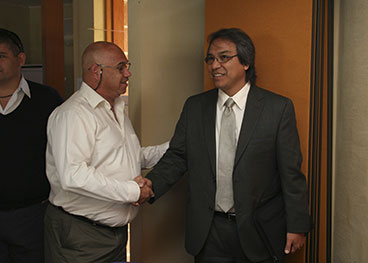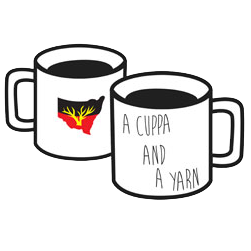
25 August, 2009
UN RAPPORTEUR TOLD: TWO GAPS NEED TO BE CLOSED
August 26, 2009
The State's peak Aboriginal representative organisation, the New South Wales Aboriginal Land Council, says two widening gaps need to be closed in Australia to ensure sustainable improvements in the health and well being and the rights of its original inhabitants.
This was Council's central message to visiting United Nations Special Rapporteur, Professor James Anaya, at a one hour meeting with him in Sydney today.
NSWALC Chairperson, Bev Manton, said the nine-member Council held wide ranging discussions with Professor Anaya on its work in pursuing cultural, social and economic independence for Aboriginal people and its ongoing work for constitutional and human rights reform.
"Our central message was that all Governments within Australia need to accelerate their efforts, in genuine partnership with our people and their representative organisations, to close the yawning gap in socio-economic outcomes between Aboriginal Australians and their fellow Australians," she added.
"A genuine sustained effort is also required by all Governments to close the gap between their political rhetoric and our reality.
"Despite the work and commitment of individual Ministers there is a growing realisation within our communities that Governments, at Federal and State level, continue to struggle to deliver outcomes against the legitimate human rights entitlements and benchmarks laid down in documents such as the United Nations Declaration on the Rights of Indigenous Peoples.
"Much lip service is paid by Governments to a new era of relations between states and Aboriginal peoples which is grounded in good faith, goodwill, mutual respect and partnerships.
"NSWALC seeks to influence the policy and reform agendas of the NSW and Commonwealth Governments through leadership and reliable evidence based advice and research.
"Our commitment to work with Governments is best illustrated by our current partnership with the State Government on a $200 million program to provide for the operation, maintenance and monitoring of water and sewerage in our communities over the next 25 years.
"However, we remain effectively locked out of any key decision making roles, particularly in key areas ranging from constitutional reform to social housing."
"This is clearly spelled out in our recent submission to the Legislative Council Inquiry into Aboriginal Disadvantage."
"We acknowledged, for instance, that New South Wales enjoys, arguably, the best land rights legislation in the world. That does not mean it cannot be improved, particularly in settling outstanding claims" Ms Manton added.
"Council asked Professor Anaya to note that land claims remained the sole form of compensation now available to redress the dispossession of Aboriginal people in NSW but more than10,000 of the19,000 land claims lodged since 1983 still remain unresolved.
"We continue to work with Local Aboriginal Land Councils to acquire cultural and economically viable land and to ensure its prudent management and development but less than 20 per cent of all land claims have been granted.
"The slow pace of determination and the success of claims are clearly unacceptable and, in our view, contrary to the spirit and the principles of the compensatory regime established by the legislation.
"At the same time, more and more of the recurrent cost of sustaining the land rights system in NSW is also being shifted from Government onto the self funded land rights network system."
Ms Manton said Council also asked Professor Anaya to take special note of its current campaign to have an Aboriginal Culture and Heritage Commission established.
"Both NSWALC and Local Aboriginal Land Councils have a statutory obligation to protect and promote Aboriginal culture and heritage but we have no effective power over its ongoing destruction.
"That is why NSWALC is now calling for urgent action to develop an Aboriginal Cultural Heritage Bill to establish an Aboriginal Cultural Heritage Commission to ensure that the ownership and control of Aboriginal heritage and culture lies with Aboriginal people."
Ms Manton said all Council members had a free ranging discussion with Professor Anaya on state, regional and national issues and how NSWALC could continue to work within the United Nations to improve the First Nations status for Aboriginal people and to ensure human rights are recognised and sustained.
"We thanked Professor Anaya for finding the time in his busy 12-day schedule to hear and discuss our views and concerns," Ms Manton added.
"We look forward to his report of the findings of his visit to a forthcoming session of the Human Rights Council"
____________________________________________________________________
Further information: Peter Windsor 0400 554 603

